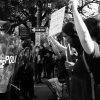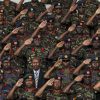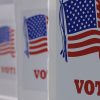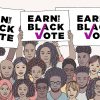By: Ericka Blount Danois
A mass of young people, 4,000 strong, locked arms Wednesday and marched from Amtrak’s Penn Station in Baltimore down to City Hall to protest the death of Freddie Gray. As they marched, a student yelled over the loudspeaker, “When you don’t say something when it’s your neighbor, what will you do when they come for you?”
But during Baltimore’s protests, “they” have come for the city’s youths.
This past Tuesday, more than 200 young people were arrested for protesting and being out after a curfew imposed by Mayor Stephanie Rawlings-Blake, including prominent student protester Joseph Kent, 21, whose arrest was captured briefly on CNN before an armored vehicle passed in front of the camera. In the next camera shot, Kent had disappeared, prompting a firestorm on Twitter over his whereabouts.
Many people who have been arrested over the last week have been held for more than 24 hours without any charges being brought against them. Although some have been let go without charges, bail for others arrested is exorbitant. (One 18-year-old reportedly seen in video footage smashing a police car is being held on $500,000 bail.) Many will be in jail for months awaiting trial.
Both President Barack Obama and Rawlings-Blake referred to young people who have damaged property and thrown rocks at police in riot gear at Camden Yards and at Penn-North as “thugs,” while white college students rioting after sports wins and loses are rarely referred to as such.
The Root spoke with several young people, and they expressed their frustrations with the criminal-justice system, biased and racist media coverage, and opportunities available to young people in the city. Here is what some of them had to say:
Andre Scott, 18, Protester and Member of the Bloods Gang
“In a sense we are feeling some type of way because it’s happening to us. Everybody that has been killed these past few years has been about in our age range: Michael Brown, Trayvon Martin. There’s a lot going on whereas we feel like we have to stand up; if we don’t it’s gonna keep happening.
“None of what happened with the looting was started by gangs. The media put that out there. It made people want to riot when we weren’t out there. The media did it to take the attention off of Freddie Gray’s funeral, which was happening that same day. We plan on protesting, but we don’t plan on harming anyone in the process. About two weeks ago, Giant [Food] hosted a community cleanup. I participated and was cutting down mulberry trees and cleaning up the streets. I try to get more people to participate, but it’s not as easy as it sounds.”
Alize LeGrand, a Student at Baltimore Community College
“I want the media and the nation to know that we are not thugs. We’re just tired. Baltimore has less opportunities than most cities. The educational system sucks. At Mondawmin Mall the police were already geared up and provoking people. Peace and respect goes both ways, so if you don’t respect us we’re not going to respect you.
“The kids are tired. We don’t have rec centers. The ones we have, you can only go if you live in the zone. There are no jobs. Growing up, Baltimore used to be so different. We see what the government is trying to do to us. If parents aren’t going to say something, then we’re going to say something. I’m not saying it was the right way, but now they hear us and and we’re getting worldwide attention. Me and my brother went to Annapolis to protest for paid leave. We are out here protesting every summer to help get young people opportunities.”
Abdul Abdullah, 22
“There are too many black people getting killed for no reason. I strongly disagree with a curfew. Why do grown people have to deal with a curfew? What about people that go to work at that hour? That’s going to cause more chaos. Then with the military riding around your house every night, you can’t get any sleep.”
Rebecca Rivera, 20, a Student at Johns Hopkins University
“I think the media coverage is one-sided and biased and portraying a narrative that isn’t true. The protests are mostly peaceful, and that’s not being portrayed. This is a problem that affects all of us; this is our city and our lives.”
Jonetta White, 21, a Student at Bryn Mawr College
“I was alarmed when I got here and saw the police and National Guard armed, and not just armed as if they were just perusing the street. It’s as if we’re in a military zone. It doesn’t make you feel like you’re a citizen any longer. You feel like you’re in a war.”
Antwain Jordan, 23, Works With the Algebra Project
“The most misrepresented thing is that it is unprovoked. The riots were a response to a day in the life of acute oppression. The school system is underfunded. The police harass the students. Opportunities are slim. There is a lack of options or access. There are so many things coming at them—on purpose. That’s what the system is designed to do. Young people are outraged.”
Albert Phillips, 25, Youth Mentor, Entrepreneur and Writer
“I grew up in Sandtown up until I was in middle school. There’s a lot of vacant buildings, crime, drugs, some of the same issues as other major cities, a lot of poverty. Those conditions have been there a long time. It affected the relationship with the police.
“The first time I got stopped by a police officer and searched, I was 9 years old. I was still playing Pokemon, not doing anything wrong, and getting stopped by a police officer. I remember police running up on people, jumping out of unmarked cars, arresting people. They would throw people down and stomp people and never got in trouble for it.
“I had a lot of problems with the mayor calling young people thugs. I think it has a lot of undertones and it has become acceptable as a way of diverting the true issues. She apologized and everything. I think that sticks with people when you say it in front of the camera around the world.














